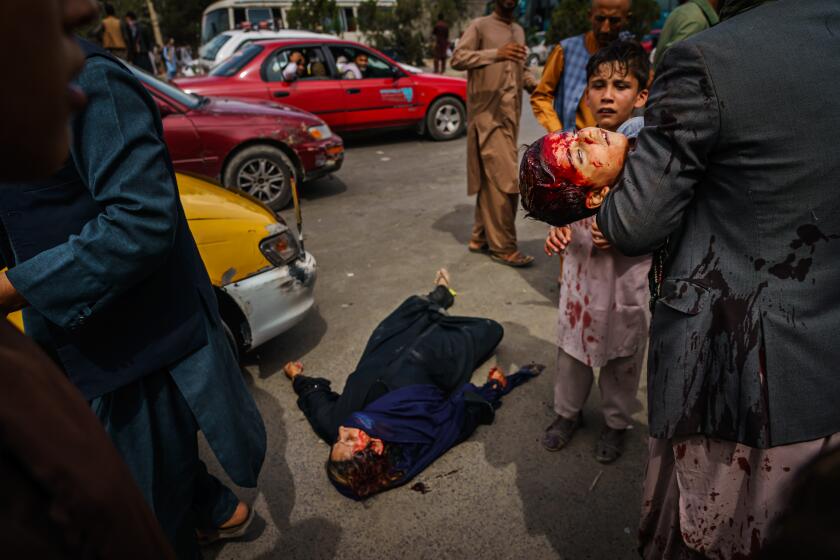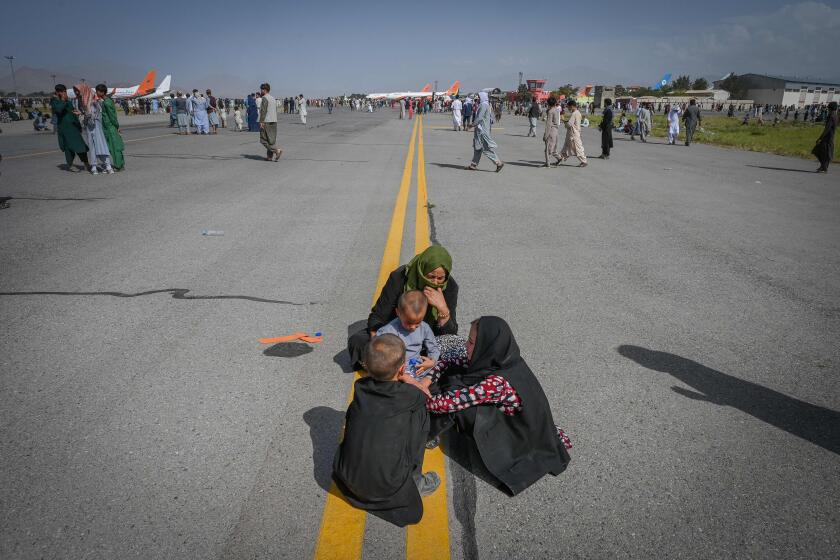‘Everybody is facing a dark future’: Afghans in the U.S. struggle to evacuate family and friends
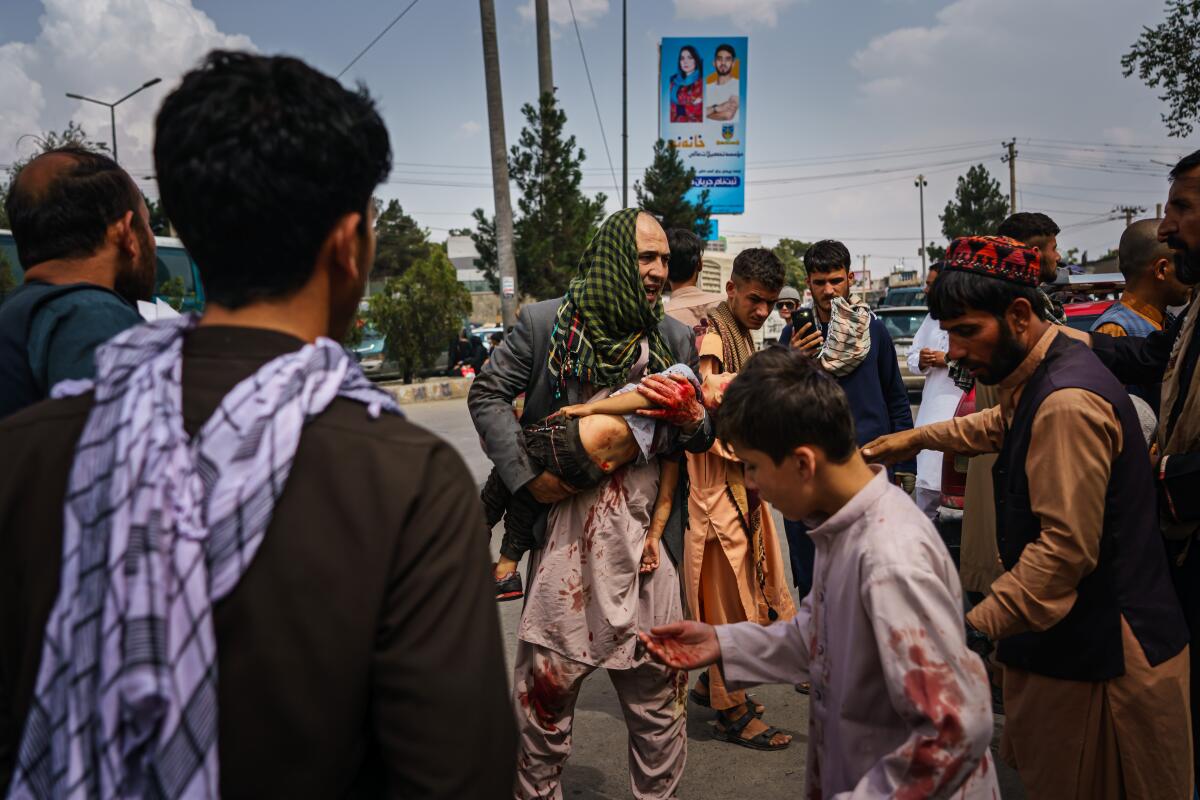
- Share via
HOUSTON — For two days, Aziz Shinwari has been fielding frantic calls and online messages from relatives in Afghanistan, trying to help get them out of the country.
Shinwari, who worked as an interpreter and guard for the U.S. military for more than a decade before relocating to Houston in 2015, fears his loved ones will be targeted.
“We have left a lot of people behind, and they could die any day. They need to leave the country as soon as possible,” said Shinwari, 36, who has relatives in the capital, Kabul, and Jalalabad to the east. “My family members, my neighbors, my friends, my co-workers keep sending me messages saying, ‘What should we do?’”
It was unclear Monday how many Afghans the U.S. plans to evacuate, who would receive priority or where they would go. The uncertainty was tormenting enclaves such as the Bay Area’s Little Kabul, home to more than 60,000 Afghan immigrants.
The Department of Defense plans to evacuate 22,000 Afghans with special immigrant visas showing they worked for the U.S. government, as well as their relatives and others considered at risk, according to spokesman Lt. Col. Chris Mitchell. The Pentagon also plans to transport up to 30,000 additional people — including U.S. Embassy personnel, citizens and visa applicants — out of Kabul, Mitchell said.
But the pace of evacuations has been slow. At a Monday briefing, Pentagon officials said they had relocated about 2,000 Afghans to the U.S., mostly to Ft. Lee, Va. They were assessing temporary sites for 22,000 more at Ft. Bliss, Texas, and Ft. McCoy, Wis.
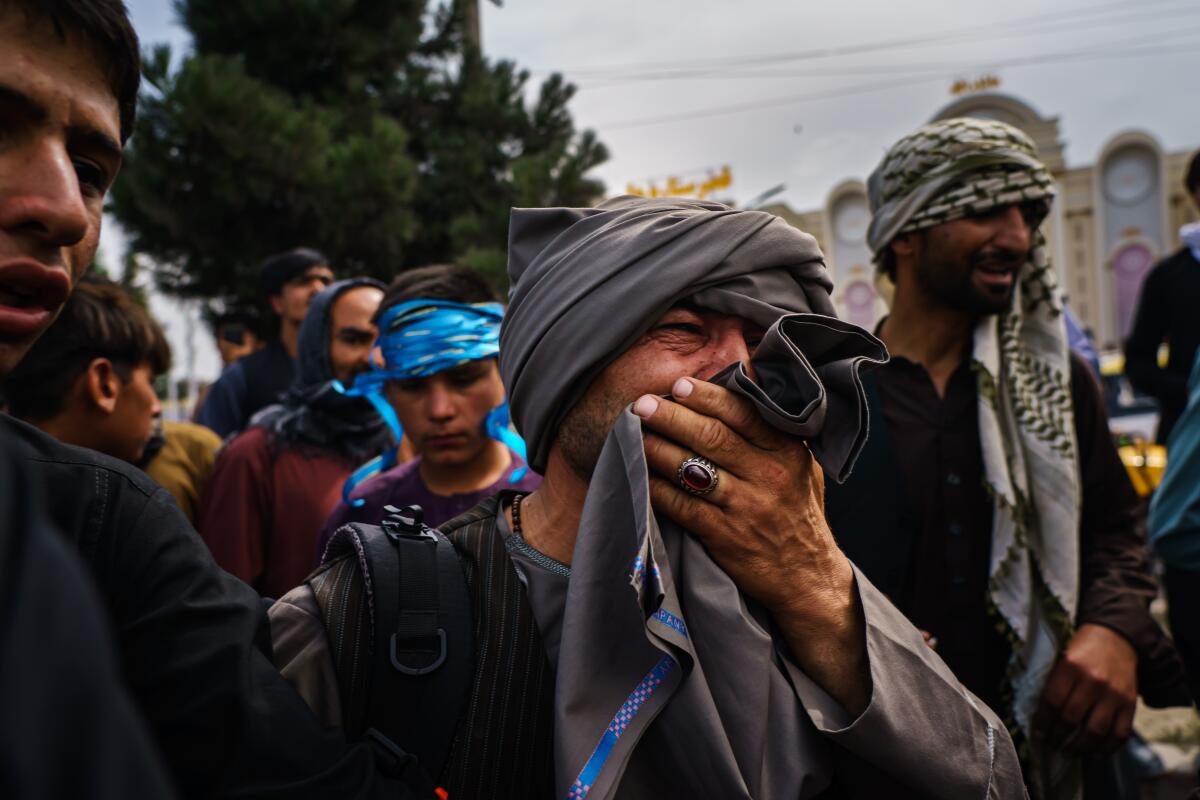
Several human-rights and migrant-advocacy groups on Monday called on the Biden administration to do more to help those trying to leave Afghanistan.
“The incredibly urgent work of protecting people from reprisals and persecution must include evacuation and resettlement of civilians who need it, including human-rights defenders, women’s rights activists, members of the media, special immigrant visa candidates and other vulnerable people,” said Omar Jadwat, director of the American Civil Liberties Union’s Immigrants’ Rights Project.
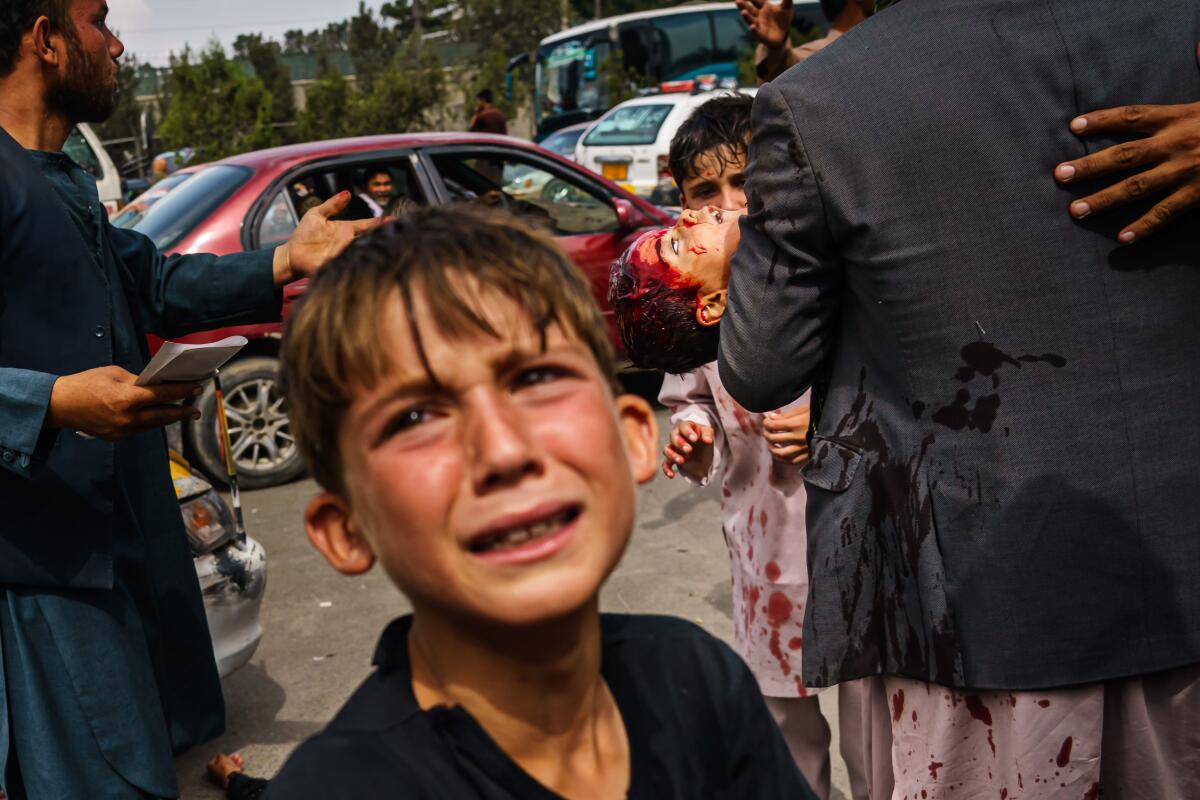
Shinwari said the U.S. government needs to expedite special immigrant visas and loosen document requirements, since Afghan government offices that issued them are now closed.
“They need to come up with an alternate solution,” he said.
Shinwari worries about his two older sisters in Jalalabad, one of whom taught at a middle school that has been closed since the Taliban seized control over the weekend.
“I just spoke to one of my sisters this morning. The Taliban told them not to get out of their homes for two days and two nights,” he said. “Everybody is facing a dark future.”
Seema Farhad has been fielding calls from some of the more than 600 families she helped resettle in the Fremont, Calif., area known as Little Kabul, working with the local Afghan Coalition.
“People in Kabul are terrified. Families are doing everything they can to leave Afghanistan, because they do not know what is to come. They’re willing to risk their lives to leave,” she said.
Farhad was trying to help a woman whose brother-in-law worked for a U.S. company in Afghanistan and needed the firm to sponsor his visa.
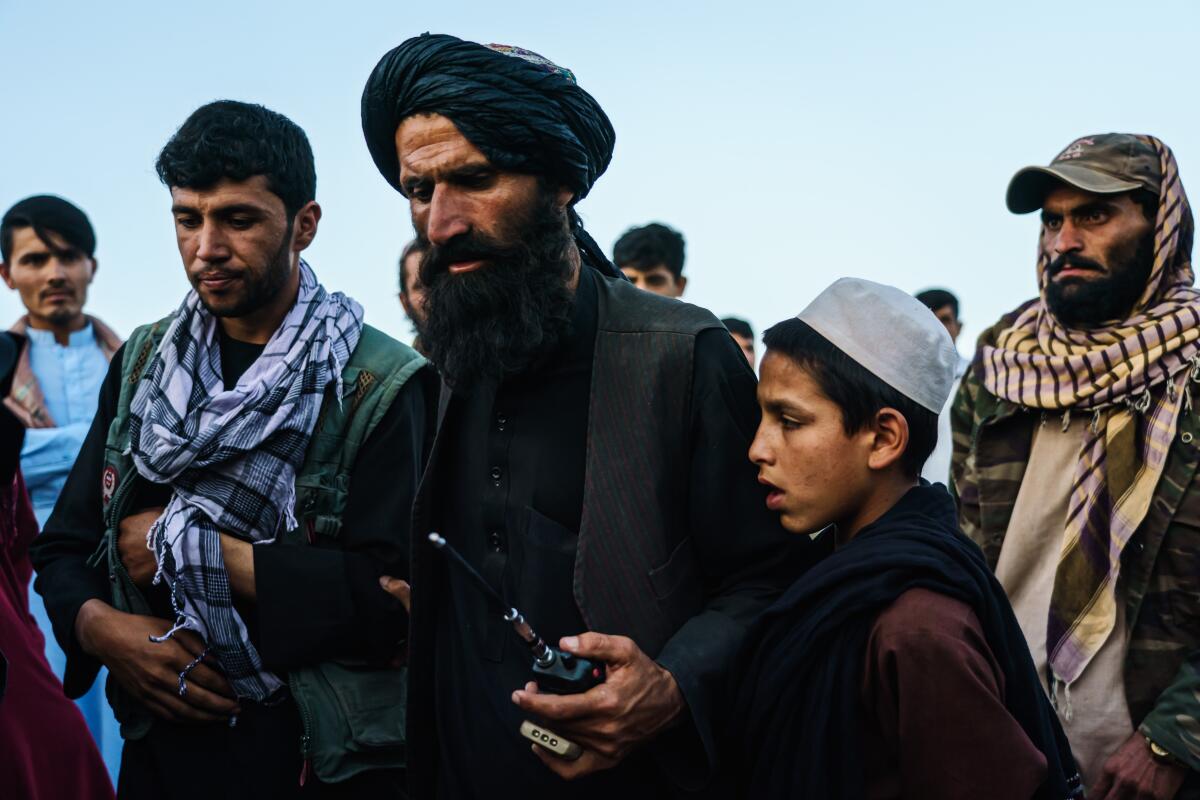
“Now there’s no rep from that company to help him get out,” she said.
Most of the families Farhad assists have 80% to 90% of their relatives in Afghanistan. She found programs to help evacuate those with approved or pending U.S. visas, but for the rest, she said, “there’s nothing yet.”
“Last night, I lost my voice crying. It’s not easy to digest what is happening,” she said.
Among those she’s trying to help is Abdul Khusrawy, 58, of Pleasanton, an artist who immigrated in 2010. His brother-in-law, an Afghan Army veteran, worked at a U.S.-sponsored television station in Kabul, and since the Taliban seized control of the country, he has received threatening phone calls warning him to stay home.
“If the Taliban know he worked for the army, they may kill him,” Khusrawy said.
His friend’s daughter, a journalist who worked at the presidential palace, is also in hiding as she plots her departure.
The Taliban swept into Kabul and seized power on Sunday after President Ashraf Ghani fled the country.
“Right now she is waiting to see if the border to Pakistan opens to Afghan people, and then she can apply for a U.S. visa,” he said. “We cannot wait. In Kabul, every day is a bad situation, especially for women, girls.”
Mohammad “Musa” Mahmodi, a human-rights lawyer at Yale University on a fellowship, has been trying to help his relatives and human-rights workers escape Afghanistan, including female prosecutors who helped jail some of the Taliban prisoners who were released over the weekend. Many had assumed that the Taliban’s takeover would be gradual and negotiated. Now, he said, “the window of opportunity is very small for anyone to get out.”
Mahmodi said it’s unclear how U.S. officials decide which Afghans, other than those who worked with the U.S. military, to evacuate.
“I have been contacting everyone I know to get help, trying to make sure they get into this evacuation list. The problem is there is a lot, lot of people, thousands of people,” he said. “They say they’re trying their best, but time is critical.”
Nisar Momand of Houston said his relatives in Afghanistan had been threatened because he and his twin brother worked for six years with U.S. forces.
“The Taliban sent us warnings that they will easily target my family in Kabul,” said Momand, 31. “Their lives are in danger now because of us.”
Momand immigrated to the U.S. with his wife and children in 2014, became a citizen, worked for a refugee resettlement agency and now works for a travel agency.
Afghans panic and try to flee Monday after Kabul fell to the Taliban
“I did not sleep for two nights, because people are calling me to see how they can fly back to the U.S.,” he said. “If the Taliban finds out they are green-card holders, they will kill them. I’m telling them to try to delete their social media, close their accounts, stay home. Thousands of people are sending me their documents saying, ‘I worked with the U.S. military — how can you help me get out?’”
Most of his friends live outside of the capital but had traveled to Kabul as the Taliban gained control of the countryside.
“Some of them are in the street, some of them are staying with friends, some are in the airport,” he said. “I talked with a few of them; they’ve seen the Taliban, but they did not give them any threat or any warning. Maybe they did not know this person was a green-card holder. But we don’t know what will happen tomorrow. I just talked to my cousin, and he said [the militants] were searching houses.”
Momand paid about $20,000 to send his mother and five siblings, including his twin, to neighboring Tajikistan. They were safe Monday, but he wasn’t sure how long they would be allowed to stay.
“We need some way to bring them here,” he said.
More to Read
Sign up for Essential California
The most important California stories and recommendations in your inbox every morning.
You may occasionally receive promotional content from the Los Angeles Times.

